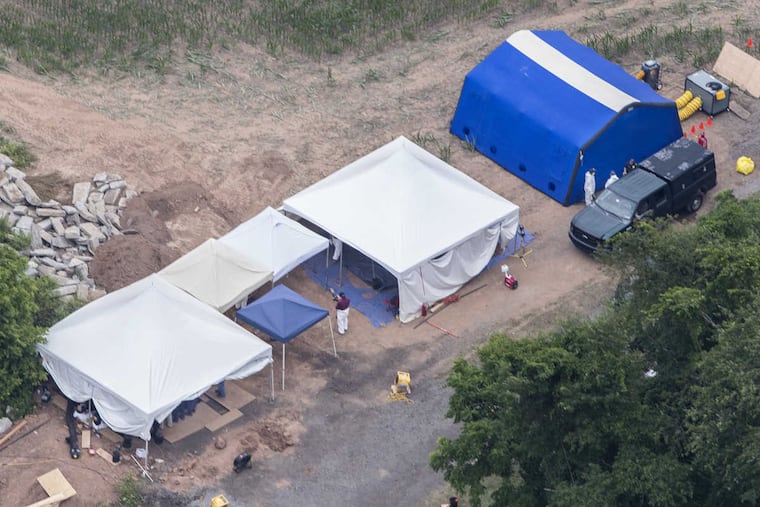Video played in Sean Kratz trial shows shifting, inaccurate statements after murders, detectives say
Sean Kratz spoke to detectives days after the murders, often contradicting himself, according to a recording of it played in court.

In 2017, days after the most gruesome murders in Bucks County history, Sean Kratz couldn’t keep his story straight. He sat with two county detectives in a Philadelphia police interrogation room and spun several versions of the events on his cousin Cosmo DiNardo’s farm in Solebury Township.
At times, he seemed to break down and cry, as depicted Thursday in a video shown to jurors in Kratz’s murder trial. But Bucks County Detective David Kemmerer, one of the lead investigators on the case, said the breakdown was a calculated sham.
“He knew these murders had taken place … and he didn’t want to tell me he was there,” Kemmerer testified. “He was distancing himself from that.”
A portion of the video, which both prosecutors and Kratz’s former attorney have characterized as a confession, was played during the first full day of testimony in Doylestown. Kratz, 22, is charged with criminal homicide and conspiracy in the deaths of Dean Finocchiaro, 19; Thomas Meo, 21; and Mark Sturgis, 22.
DiNardo, 22, confessed to the killings, which took place after he lured the three to the farm on the promise of selling them large amounts of marijuana. He had also killed a fourth victim, Jimi Patrick, 19, days earlier.
DiNardo is serving four consecutive life sentences in state prison. Kratz refused two plea deals, triggering the trial.
Prosecutors say Kratz assisted in the killings, shooting Finocchiaro and acting as a lookout while DiNardo attacked Meo and Sturgis. Kratz’s attorney, A. Charles Peruto Jr., said DiNardo was a “psychopath" who threatened to kill Kratz and his family if he didn’t cooperate.
During the video-recorded interrogation, Kratz called DiNardo “a sick monster” and said DiNardo threatened him with a handgun if he refused to help him dispose of the three bodies.
“He said he was going to get them weed. He went on a rampage,” Kratz told the detectives. “He’s like a light switch — one minute he’s fine, the next he’s raging.”
After initially denying that DiNardo gave him the murder weapon to hide, Kratz led county detectives to its hiding spot: an ivy-covered patch of his aunt’s front yard in Ambler, Chief County Detective Martin McDonough told jurors.
Hollow-point bullets matching the .357 magnum revolver were found in all three victims, who were buried in a 12½-foot hole on the DiNardo farm. Their bodies had been soaked so thoroughly in gasoline, their clothing had to be destroyed because of the fumes.
DiNardo told detectives he and Kratz had tried to burn the bodies in a pig roaster. The roaster, a converted oil drum, was buried in the makeshift grave with them.
Ian Hood, a forensic pathologist, testified Thursday that all three had been shot in the back, as if the gunman had fired at them while they were running or turning away.
Finocchiaro was struck twice in the head, Hood said, and Sturgis was struck by a shot that tore through his torso and “basically cut his heart in half.”
Meo died not from his bullet wound but from severe blunt-force trauma to his head and torso, impacts that fractured his skull and injured his brain.
Prosecutors allege that DiNardo ran Meo over with a backhoe. Kratz, in his statements to detectives, corroborated this, saying Meo screamed for help and DiNardo taunted him, promising to take him to the hospital.
As the killings were unfolding, DiNardo’s father, Antonio, was pulling into the driveway leading to the farm with Catarina Dionisio, the bookkeeper at his concrete company and his mistress.
Dionisio told jurors on Thursday that the trip to the farm was interrupted when the elder DiNardo saw a “thin white man” who she believed was Kratz. That unexpected appearance, she said, startled Antonio DiNardo, who did not want his son to know about their affair, and they left immediately.
Kratz, in his statement to police, presented a different version: He said an angry Cosmo, after spotting his father driving toward the farm, flew into a rage and called his father immediately.
“He was raging,” Kratz said. “He said that if his dad wasn’t going to help, he’d kill him, too.”